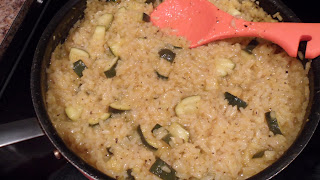 |
| The finished lemon zucchini risotto |
Tonight, I made a lemon zucchini risotto. The recipe came from The Complete Vegan Kitchen by Jannequin Bennett. Usually, risottos call for onions or shallots. I do NOT care for either one; I left it out, and the result was still delish! I have made many risottos before, and I have never included the onion or shallot in the recipe. I haven't ever had an issue because of that.
Something I have learned along the way: with any recipe that calls for onions, shallots and/or scallions, I leave them out. For example, when a recipe starts out with heating some oil in a pan and then adding in onions and garlic and sauteing for a few minutes, I don't include the onion. What I actually do is while the oil is heating, I get the garlic ready. I also get the next few ingredients ready to toss in because you only need to saute the garlic for about 30 seconds or so. If you burn the garlic, you need to toss it and start again. You will need to scrub the pan very well or start with a new, clean pan. Burnt or bitter garlic is not tasty.
Back to the recipe! This particular risotto is vegan, meaning there are no animal products in it at all. There isn't any cheese or dairy-based butter in this recipe.
The recipe calls for basil, and it offers measurements for fresh basil and dried basil. I like to opt for the dried herbs because I find fresh herbs to be annoying as far as how fast they go bad.
Something I have learned: dried herbs are easier to use, last longer, and go a longer way. You use less, but it has the same impact as a greater amount of fresh herbs. You just have to make sure to rotate the dried herbs once they expire.
I love lemons, so I added twice the amount of lemon the recipe called for. The ingredient list had the zest and juice of one lemon. I added the zest and juice of two lemons, and it was perfect. It had the right amount of acid and tang.
As far as the wine that risottos need, I use Yellow Tail. These wines are inexpensive, but they taste great. The alcohol cooks off in the process, but the flavor that is left is nice. That is an important aspect of cooking with wine. If you wouldn't drink it, then you shouldn't cook with it.
Like with any risotto (that I've made), you have to babysit it and stir it constantly, so that you can develop the starches in the rice. With that, you get a creamy result that is delish.
I hope my experience with this dish has given you some ideas and helpful tips for the next time you cook a risotto.

No comments:
Post a Comment